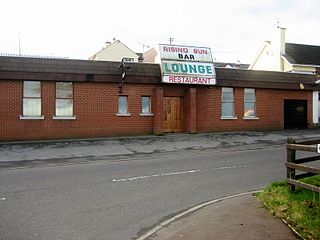 W
WThe 1991 Craigavon killings took place on 14 November 1991 when the Mid-Ulster Brigade of the Ulster Volunteer Force (UVF) shot dead three civilians at the Carbet Road-Carn Road junction near Craigavon, County Armagh, Northern Ireland, on their way home from work at the Hyster forklift factory just outside Lurgan.
 W
WOn 28 March 1991 the Loyalist paramilitary organization the Ulster Volunteer Force (UVF) carried out a gun attack on a mobile shop in the Drumbeg estate in the town of Craigavon in County Armagh shooting dead three Catholic civilians. Two of those killed were teenage girls.
 W
WOn 14 November 1992, the Ulster Defence Association using the cover name the Ulster Freedom Fighters (UFF) launched a gun and grenade attack on James Murray's bookmakers on the Oldpark Road in Belfast, Northern Ireland. One gunman opened fire on the customers, whilst another threw a grenade into the shop. The shop was in an Irish nationalist area and all of the dead were local Catholic civilians.
 W
WOn 22 December 1991, the Ulster Freedom Fighters (UFF) of the Ulster Defence Association shot dead a Catholic civilian and badly injured an eight-year-old boy and two men in the Devenish Arms pub in Belfast, Northern Ireland.
 W
WThe Donegall Arms shooting took place on 21 December 1991, when gunmen from the small Irish Republican paramilitary group the Irish People's Liberation Organisation (IPLO) burst into the Donegall Arms public house and sprayed it with gunfire, killing two Protestant civilians and injuring several others in the bar. The attack happened at a time when Republican and Loyalist paramilitaries were engaged in many tit-for-tat killings.
 W
WThe Dunblane massacre took place at Dunblane Primary School near Stirling, Scotland, United Kingdom, on 13 March 1996, when Thomas Hamilton shot dead sixteen pupils and one teacher, and injured fifteen others, before killing himself. It remains the deadliest mass shooting in British history.
 W
WThe Greysteel massacre was a mass shooting that took place on the evening of 30 October 1993 in Greysteel, County Londonderry, Northern Ireland. Members of the Ulster Defence Association (UDA), a loyalist paramilitary group, opened fire on civilians in a crowded pub during a Halloween party, killing eight and wounding nineteen. The pub was targeted because it was frequented by Catholics, though two of the victims were Protestant. The group claimed responsibility using their cover name "Ulster Freedom Fighters", saying the attack was revenge for the Shankill Road bombing by the Provisional IRA a week earlier. Four men were sentenced to life imprisonment for the massacre, but were released in 2000 under the terms of the Good Friday Agreement.
 W
WThe Loughinisland massacre took place on 18 June 1994 in the small village of Loughinisland, County Down, Northern Ireland. Members of the Ulster Volunteer Force (UVF), a loyalist paramilitary group, burst into a pub with assault rifles and fired on the customers, killing six civilians and wounding five. The pub was targeted because it was frequented mainly by Catholics, and was crowded with people watching the Republic of Ireland play against Italy in the 1994 FIFA World Cup. It is thus sometimes called the "World Cup massacre". The UVF claimed the attack was retaliation for the killing of three UVF members by the Irish National Liberation Army (INLA).
 W
WOn 5 February 1992, a mass shooting took place at the Sean Graham bookmaker's shop on the Lower Ormeau Road in Belfast, Northern Ireland. Members of the Ulster Defence Association (UDA), a loyalist paramilitary group, opened fire on the customers, killing five civilians and wounding another nine. The shop was in an Irish nationalist area, and all of the victims were local Catholic civilians. The UDA claimed responsibility using the cover name "Ulster Freedom Fighters", and said the shooting was retaliation for the Teebane bombing, which had been carried out by the Provisional IRA less than three weeks before.